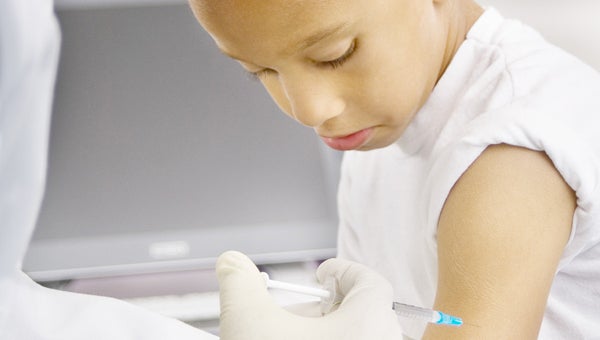Value in immunization: Health care professionals support vaccinations for young, old
Published 12:11 am Saturday, August 1, 2015

- The National Public Health Information Coalition reports vaccination rates for some diseases are not meeting national public health goals.
August is National Immunization Awareness Month, which organizers say provides an opportunity for health care professionals to highlight the value of immunization, regardless of the receiver’s age.
According to the Centers for Disease Control and Prevention, the aim of recognizing the month is to encourage “all people to protect their health by being vaccinated against infectious diseases.”
While the CDC calls immunizations “one of the top 10 public health accomplishments of the 20th Century,” information from the National Public Health Information Coalition reports vaccination rates for some diseases are not meeting national public health goals.
“We need to remind people that immunizations aren’t just for children,” the NPHIC website states. “They are needed throughout our lifetime.”
Pregnant women
While women should be up to date on their vaccines before becoming pregnant, experts say they should receive vaccines against the flu and whooping cough during pregnancy.
“These vaccines not only protect the mother by preventing illnesses and complications but also pass on vaccine protection to her unborn child,” NPHIC officials state. “Women who are planning to become pregnant may need to receive some vaccines before the start of pregnancy. These vaccines may need to be administered a number of weeks before a woman becomes pregnant so that she is adequately protected. Some vaccine-preventable diseases, such as rubella, can lead to significant complications, including birth defects.”
Because pregnant women are at an increased risk for complications from the flu, experts say they should plan on receiving the flu and whooping cough vaccines during each pregnancy.
In addition, women are also recommended to get the Tdap vaccine each time they are pregnant, preferably at 27 through 36 weeks.
Birth to age 6
Once born, babies receive vaccinations experts say help protect them from 14 diseases by age 2. After age 2, children are recommended to receive a yearly flu vaccine and will be due for additional vaccine doses between 4 and 6 years of age.
“Getting all of the recommended vaccines is one of the most important things parents can do to protect their children’s health,” the NPHIC website states. “When children are not vaccinated, they are at increased risk for disease and can spread disease to others in their play groups, child care centers, classrooms and communities – including babies who are too young to be fully vaccinated.”
Because of the number of children present and the type of interaction, child care settings and schools are noted as being highly susceptible to outbreaks of infectious diseases because students can easily spread illnesses to one another as a result of poor hand washing, uncovered coughs and dense populations.
Concerns
Dr. Wendi DeFrank of Rainbow Pediatrics in LaPlace said there has been a rise in the number of parents concerned about a possible link between autism and vaccinations, which she said her patients watch played out in the national media.
While autism is a difficult problem for children and families, DeFrank believes vaccinations have been proven safe.
“The original study that proposed a link between MMR (measles, mumps, and rubella vaccine) and autism was flawed and false,” DeFrank said. “Vaccinations not only protect the vaccinated children against contagious diseases, but they protect those children who cannot be vaccinated, such as those on chemotherapy, those who are on immunosuppressive drugs following transplantation and those with severe immune deficiencies.”
DeFrank said doctor-recommended vaccination schedules are structured to provide stepwise immune response and coverage for diseases to children, and staying on schedule prevents the need for “catching up” and causing children to receive multiple vaccines at one time.
“We use car seats and baby monitors to protect our children,” she said. “Vaccination is simply another great way to protect our children.”
Preteens – Adults
Preteens and teens are recommended to get the Tdap (tetanus, diphtheria, pertussis) vaccine, quadrivalent meningococcal conjugate vaccine and human papilloma virus vaccine to protect against serious diseases. A yearly flu vaccine is also recommended for all children 6 months and older.
Vaccines shouldn’t stop in adulthood, experts say, as even healthy adults can become seriously ill and pass certain illnesses to others.
Immuni-zation is especially important for older adults and for adults with chronic conditions such as asthma, diabetes or heart disease.
Doctors say all adults should get the flu vaccine each year, and every adult should also get certain vaccines if they did not receive them as an adolescent to protect against pertussis. NPHIC information states adults may need other vaccines such as shingles, pneumococcal, hepatitis, HPV depending on one’s age, occupation, travel, health status, vaccination history and other risk factors.





